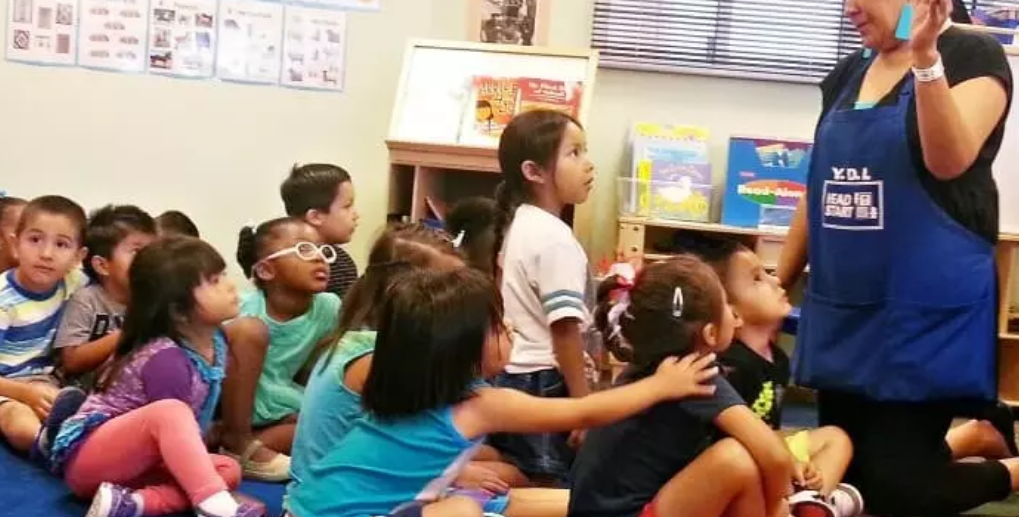
- Details
- By Native News Online Staff
DENVER — The American Indian College Fund received a two-year, $600,000 grant from The W.K. Kellogg Foundation, to help tribal college communities strengthen and expand the pipeline for Native teachers through its Indigenous Early Childhood Education Systemic Engagement and ECE Learning in Native American Communities program.
Early childhood education can help close the college education attainment gap among American Indians and Alaska Natives—which is currently less than half of other groups at 14.8 percent—by improving students’ academic achievement, according to the U.S. Department of Education.
Indigenous teachers serve as critical role models engendering the success of young Native American students, while understanding the unique needs of their students. In addition to improving young children’s long-term educational attainment, early childhood education can also reduce the need for special education and increase employment and earnings, according to the U.S. Department of Education.
The American Indian College Fund’s two-year systemic engagement program will provide program mentorship between tribal colleges and universities (TCUs) and their students and will help increase TCUs’ capacity to address and eliminate barriers for Native American college students seeking a degree in early childhood education. The systemic engagement program will support dissemination of new knowledge and methods of culturally centered early childhood education in tribal college communities.
“Native people know that our children come to us from a sacred place and that their socialization is critical to their own well-being and to the well-being of tribal nations. We appreciate our partnership with The W.K. Kellogg Foundation because it results in our TCUs adapting our teachings and practices into modern infrastructure, demonstrating resiliency and commitment to kinship and identity,” Cheryl Crazy Bull, President and CEO of the American Indian College Fund said,
The program is already underway. It began November 1, 2020.
More Stories Like This
American Indian College Fund Names 12 Student Ambassadors for 2025–262025 State of the American Indian College Fund Released for Native American Heritage Month
American Indian College Fund Launches National Campaign for Native American Heritage Month
Four-Day Event Will Connect TCUs with Native Students Interested in Pursuing Higher Education
Native Women Share Their Journeys in Higher Education in New Book
Help us tell the stories that could save Native languages and food traditions
At a critical moment for Indian Country, Native News Online is embarking on our most ambitious reporting project yet: "Cultivating Culture," a three-year investigation into two forces shaping Native community survival—food sovereignty and language revitalization.
The devastating impact of COVID-19 accelerated the loss of Native elders and with them, irreplaceable cultural knowledge. Yet across tribal communities, innovative leaders are fighting back, reclaiming traditional food systems and breathing new life into Native languages. These aren't just cultural preservation efforts—they're powerful pathways to community health, healing, and resilience.
Our dedicated reporting team will spend three years documenting these stories through on-the-ground reporting in 18 tribal communities, producing over 200 in-depth stories, 18 podcast episodes, and multimedia content that amplifies Indigenous voices. We'll show policymakers, funders, and allies how cultural restoration directly impacts physical and mental wellness while celebrating successful models of sovereignty and self-determination.
This isn't corporate media parachuting into Indian Country for a quick story. This is sustained, relationship-based journalism by Native reporters who understand these communities. It's "Warrior Journalism"—fearless reporting that serves the 5.5 million readers who depend on us for news that mainstream media often ignores.
We need your help right now. While we've secured partial funding, we're still $450,000 short of our three-year budget. Our immediate goal is $25,000 this month to keep this critical work moving forward—funding reporter salaries, travel to remote communities, photography, and the deep reporting these stories deserve.
Every dollar directly supports Indigenous journalists telling Indigenous stories. Whether it's $5 or $50, your contribution ensures these vital narratives of resilience, innovation, and hope don't disappear into silence.
 The stakes couldn't be higher. Native languages are being lost at an alarming rate. Food insecurity plagues many tribal communities. But solutions are emerging, and these stories need to be told.
The stakes couldn't be higher. Native languages are being lost at an alarming rate. Food insecurity plagues many tribal communities. But solutions are emerging, and these stories need to be told.
Support independent Native journalism. Fund the stories that matter.
Levi Rickert (Potawatomi), Editor & Publisher

